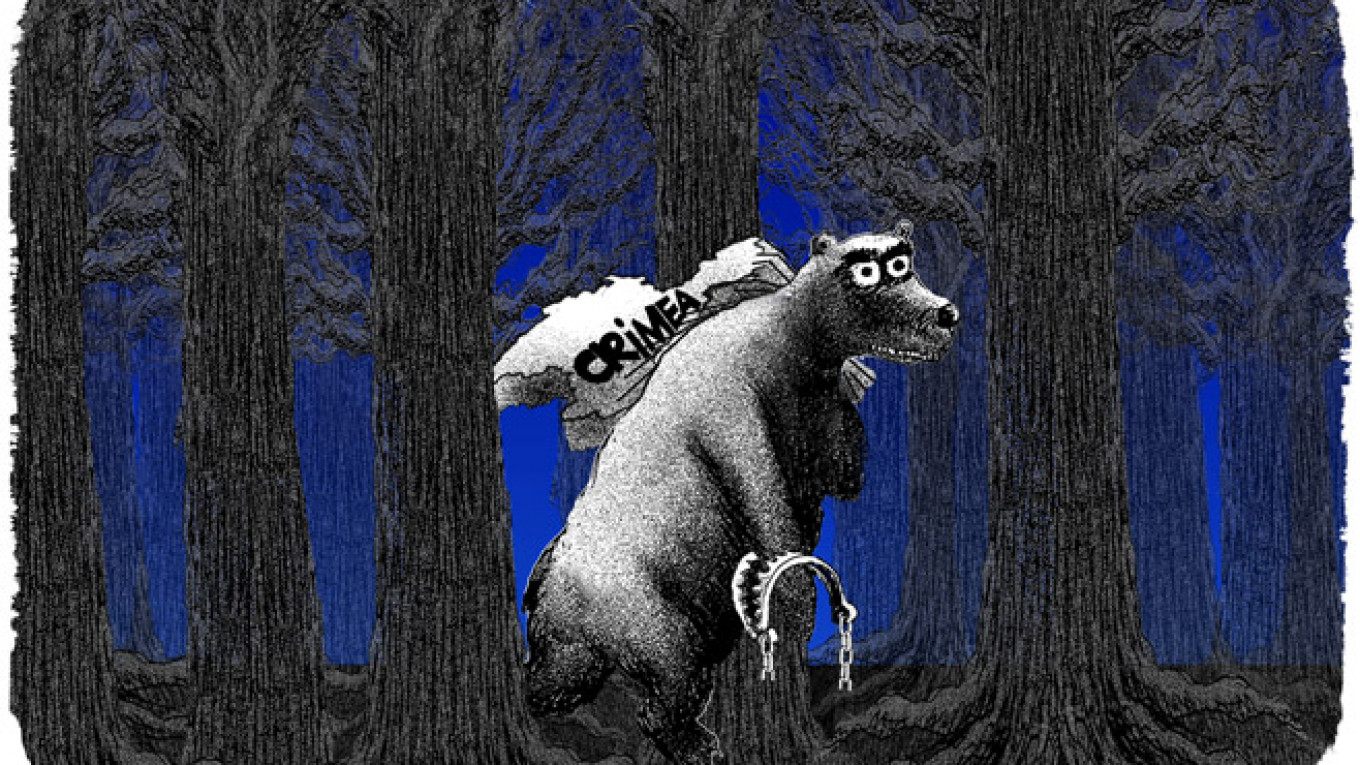The one-year anniversary of the takeover of Crimea sparked renewed debate over what that means for Russia's history. Perhaps the main result is that it put a definitive end to the history of the Soviet state.
The Crimea question has been around since 1991, when the leaders of Russia, Ukraine and Belarus met at Belovezhskaya Pushcha in Belarus to abolish the Soviet Union, free themselves of Soviet control as personified by former Soviet leader Mikhail Gorbachev and gain full control over their respective republics.
But they chose not to risk dealing with the delicate issue of Crimea, leaving that political time bomb for future generations to defuse. They didn't, and in 2014 it exploded, setting off a chain reaction.
Crimea was a milestone in the history of the Soviet Union's disintegration. As strange as it might sound, this huge territory remained relatively stable, with some exceptions during wars and other upheavals. Nobody seriously questioned its configuration as it stood following the Soviet collapse. But now the idea of one day returning Crimea to Ukraine is not even on the table.
The events of 2014-15 are the final act of a drama that began in the 1980s and 1990s. Russian self-determination put an end to Gorbachev's perestroika and the attempt to reform the Soviet Union. In fact, the Soviet Union was doomed from the moment Russia's political forces ceased associating themselves with the center of that union. There were several reasons for this.
The progressive democrats considered Gorbachev indecisive and out of touch, while the communist reactionaries saw him as a radical traitor. Everyone wanted to distance themselves from him, and Gorbachev's desire to pursue a neutral, centrist path proved fatal.
By themselves, the efforts of the Baltic republics, the Caucasus or even Ukraine could not have led to the rapid disappearance of such a large country. Only the will of the Russian establishment — first the old, attempting to hold onto power while turning its back on the general secretary, and then the new, eager to take the helm — had the power to bring down the Soviet empire.
It is only natural that today's Russian leadership, as the heir to the leadership that put an end to the Soviet Union 25 years ago, is taking the next step in the same direction.
The "Russian world" to which President Vladimir Putin refers is not an attempt at holding a zone of influence, much less at imperial expansion. Rather, it is a conceptual, rather than administrative, delineation of mental ethnic boundaries, an attempt to define Russians as apart from others.
The final years of the Soviet Union were marked by rich intellectual life — initially semi-underground, and then increasingly public. The Soviet project was always an impressive undertaking, and attempts at its transformation retained that aspect of scale.
Its repercussions were felt around the world. At home, the idea of reform spawned active debate of every type, much of which is still interesting to read. It often devolves into endless Russian arguments over the best path of development, but it is not narrow-minded because the Soviet Union was a global power and therefore always thought in broad categories. The Kremlin believed that by changing the state, it would change the world.
With the collapse of the Soviet Union, the country's international ideological campaign ended and Russia shifted its focus inward. The restructured Soviet leadership did an about face, rejecting class values for universal human values. Russian leaders took a long hiatus from any form of values-based rhetoric.
There was no opportunity for reflection immediately after the collapse: all efforts were directed toward social, economic and political survival. Then pragmatism prevailed and leaders set out to repair the structure of the state. That was followed by a period of searching that led to an interest in values — this time national, if not nationalistic.
However, nationalism is more limited in its scope than universal or even class values, and cannot attract anyone beyond the members of its specific cultural and ethnic group.
Perestroika was the most recent period of Russian history when the country not only drew attention, but offered a "grand idea," striving to attract the world with its new openness. Post-Soviet Russia at first tried to follow in the tracks of others. It hoped to integrate into the world of Western ideas, but became disillusioned when that approach did not achieve the desired results.
Those grievances gave rise to a defensive ideology inspired not by a desire to look beyond Russia's borders, but to buttress itself against an unpredictable and dangerous world.
In this sense, Gorbachev's perestroika and Putin's modernity are at opposite extremes. The optimistic idealism of the late 1980s is diametrically opposed to the grim realism of the mid-2010s.
But in both eras, political interests eclipsed economic considerations, the latter receiving short-lived tentative overtures at best. The "acceleration" that preceded perestroika and glasnost compares to the "modernization" of 2008-2011. Both were empty and soon-forgotten slogans.
However, the discrepancy between the country's weak economic foundations and the overly heavy political structure it supported proved fatal to the Soviet Union, and threatens the current Russian government as well.
When Mikhail Gorbachev became the general secretary of the Communist Party Central Committee 30 years ago in March 1985, nobody could then imagine that the country stood on the verge of convulsions that would reverberate for decades.
The naive faith Soviet leaders held 25 years ago that the country would smoothly and easily make the transition to a better mode of functioning proved unfounded — and the zigzag course Russia has since pursued is the natural consequence of those events.
Unfortunately, it remains unclear how long Russia will continue searching for its own path.
Fyodor Lukyanov is editor of Russia in Global Affairs.
A Message from The Moscow Times:
Dear readers,
We are facing unprecedented challenges. Russia's Prosecutor General's Office has designated The Moscow Times as an "undesirable" organization, criminalizing our work and putting our staff at risk of prosecution. This follows our earlier unjust labeling as a "foreign agent."
These actions are direct attempts to silence independent journalism in Russia. The authorities claim our work "discredits the decisions of the Russian leadership." We see things differently: we strive to provide accurate, unbiased reporting on Russia.
We, the journalists of The Moscow Times, refuse to be silenced. But to continue our work, we need your help.
Your support, no matter how small, makes a world of difference. If you can, please support us monthly starting from just $2. It's quick to set up, and every contribution makes a significant impact.
By supporting The Moscow Times, you're defending open, independent journalism in the face of repression. Thank you for standing with us.
Remind me later.








